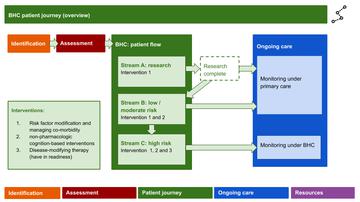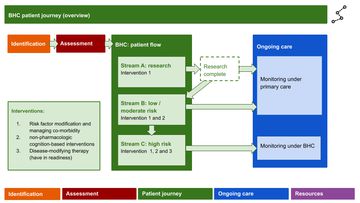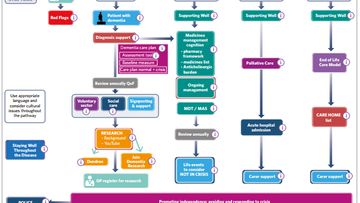A practical model for dementia prevention
NewsDementia is affecting increasing proportions of our population – but did you know that over 30% of all dementia is potentially preventable by reducing many of the health and lifestyle risks we already understand?
This includes vascular risk factors like obesity, diabetes, high blood pressure, smoking, and alcohol misuse. It also includes lesser-known risk factors like inactive lifestyles, loneliness, later-age depression, mid-life hearing impairment, and less common risks like head-injury and delirium.
A new service model, the Brain Health Clinic, is being proposed by a consensus group of dementia specialists*. They have created a clear and concise set of guidance and information, or ‘blueprint’ for a preventative service. The blueprint provides evidence-based support to professionals so that they can identify people who have early cognitive decline and work with them to reduce their risk of their transitioning to dementia in the future (fig 1).

Figure 1: The Brain Health Clinic blueprint overview
At the moment, people diagnosed with early cognitive decline including mild cognitive impairment (MCI), who may be in the pre-dementia stage, are generally referred back to primary care without intervention to wait for dementia to emerge before action is taken. This model of care means that every person at risk of transitioning to dementia is likely to do so. ‘At risk’ does not need to be synonymous with a diagnosis.
The stats
The National Audit for Dementia states that there are 850,000 people living with dementia in the UK. This is expected to rise to one million by 2025 and continue to increase to two million by 2051 (NAD 2019). That’s 150,000 more people living with dementia in 6 years.
If around 30% of dementia is preventable, BHCs, or similar preventative services, could reduce that number by 500. That’s 500 people in the UK who won’t be living with dementia in 6 years’ time. If they receive preventative care now.
In the next 38 years based on the NAD’s data, that is 3,795 people who could be prevented from living with dementia.
The Brain Health Clinic blueprint
The Brain Health Clinic blueprint is an accessible document setting out the key components of a BHC preventative model which can be adapted to any region and their needs.
It includes:
- Identification: finding people with early cognitive decline, including MCI, early in their journey;
- Assessment: gauging people’s level of risk for transitioning to dementia and striating them into one of three risk ‘streams’ using evidence-based tools across clinical, cognitive, behavioural, functional and biological domains;
- Patient journey (fig 2): tailoring the newly developed intervention models – lifestyle risk modification and comorbidity management, cognitive training and disease-modifying therapies - to their individual needs;
- Ongoing care: providing continued care and monitoring within primary care or under the BHC depending on their level of risk;
- Resources: patient-facing information, evidence-based examples from around the UK, ideas for service reconfiguration, optimal staff roles and responsibilities, references and further reading, and support for business cases.

Figure 2: The ‘patient journey’, via a BHC, when identified as having early cognitive decline including MCI
By using existing resources, and reconfiguring the way current services are provided, local areas can adopt the BHC model and support people with early cognitive impairment to remain well for longer, changing outcomes, and potentially preventing up to 3 in 10 people from developing dementia.
The blueprint is available for use and will be available for discussion at the next Dementia MasterClass. If you are interested in using it to expand your local focus to include prevention as well as treatment, and are willing to provide feedback on using the blueprint, please get in touch.
Download
The embedded blueprint below is interactive:
- the footer can be used to navigate the document,
- the boxes in any given section which are showing their position in the overall patient journey link to the page with their specific information,
- weblinks take you to the relevant page online.
You can download the PDF below via the download button.
(Version 2: April 2020)
*The method and research behind the blueprint is supported by an academic article, published in the Journal of Neurodegenerative Disorders, ISSN: 2642-4274. Article available here.
'A Brain Health Clinic blueprint to detect and manage early-stage cognitive decline: consensus guidance'
Iracema Leroi*, Charlotte Peel, Rebecca Davenport, Ross Dunne, Louise Ebenezer, Mahesh Gopakumar, Mehran Javeed, Vachagan Krishnaswami, Jane Lumsden, Helen Martin, Jane Price, Wilby Williamson
*corresponding author: Global Brain Health Institute, Trinity College Dublin, Republic of Ireland
Related articles
Promoting prevention, supporting management
Led by proactive clinicians determined to see improvement in the way we prevent, diagnose and manage dementias, Dementia Academy supports healthcare professionals with the latest tools, resources and courses to do just that.


